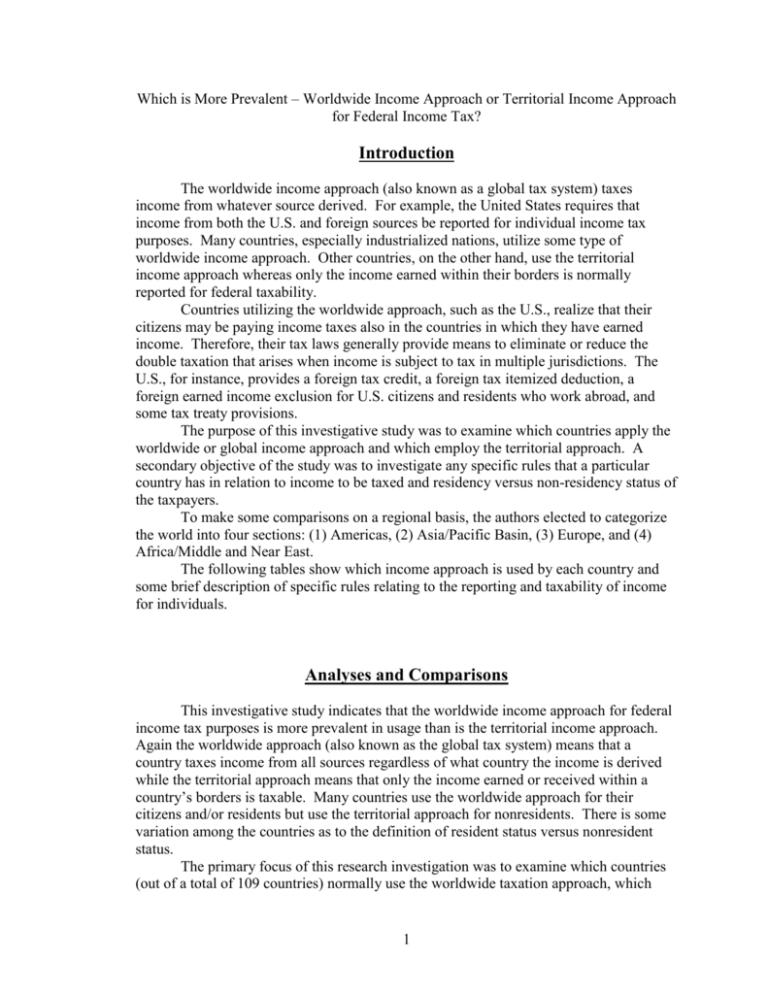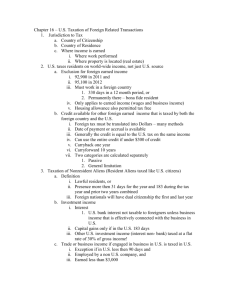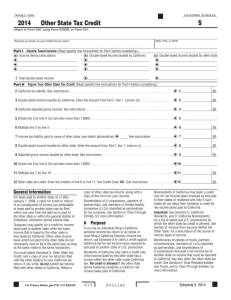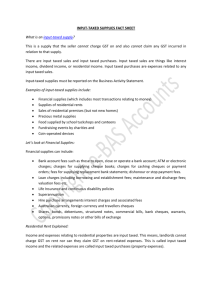worldwide income approach
advertisement

Which is More Prevalent – Worldwide Income Approach or Territorial Income Approach for Federal Income Tax? Introduction The worldwide income approach (also known as a global tax system) taxes income from whatever source derived. For example, the United States requires that income from both the U.S. and foreign sources be reported for individual income tax purposes. Many countries, especially industrialized nations, utilize some type of worldwide income approach. Other countries, on the other hand, use the territorial income approach whereas only the income earned within their borders is normally reported for federal taxability. Countries utilizing the worldwide approach, such as the U.S., realize that their citizens may be paying income taxes also in the countries in which they have earned income. Therefore, their tax laws generally provide means to eliminate or reduce the double taxation that arises when income is subject to tax in multiple jurisdictions. The U.S., for instance, provides a foreign tax credit, a foreign tax itemized deduction, a foreign earned income exclusion for U.S. citizens and residents who work abroad, and some tax treaty provisions. The purpose of this investigative study was to examine which countries apply the worldwide or global income approach and which employ the territorial approach. A secondary objective of the study was to investigate any specific rules that a particular country has in relation to income to be taxed and residency versus non-residency status of the taxpayers. To make some comparisons on a regional basis, the authors elected to categorize the world into four sections: (1) Americas, (2) Asia/Pacific Basin, (3) Europe, and (4) Africa/Middle and Near East. The following tables show which income approach is used by each country and some brief description of specific rules relating to the reporting and taxability of income for individuals. Analyses and Comparisons This investigative study indicates that the worldwide income approach for federal income tax purposes is more prevalent in usage than is the territorial income approach. Again the worldwide approach (also known as the global tax system) means that a country taxes income from all sources regardless of what country the income is derived while the territorial approach means that only the income earned or received within a country’s borders is taxable. Many countries use the worldwide approach for their citizens and/or residents but use the territorial approach for nonresidents. There is some variation among the countries as to the definition of resident status versus nonresident status. The primary focus of this research investigation was to examine which countries (out of a total of 109 countries) normally use the worldwide taxation approach, which 1 normally use the territorial approach, and what specific rules are regulated in relation to these income approaches (especially concerning the countries’ definitions of residence status versus nonresident status). In this study there were 10 countries that have no individual income tax, and thus for those nations the subject matter would be irrelevant. As stated in the introduction, comparisons are made on a regional basis (Americas, Asia/Pacific Basin, Europe, and Africa/Middle and Near East). Table 1 shows the number of countries in each category. Table 1 also includes the number of countries which have no individual income taxes (making this subject matter not relevant). Table 1 Countries by region in each category Region Americas Asia/Pacific Basin Europe Africa/Middle and Near East Total Worldwide Number of Countries Territorial None 14 21 32 9 76 9 7 0 7 23 5 1 0 4 10 Total 28 29 32 20 109 Based on the data from the previous table, the worldwide approach is much more prevalent (76 countries) than the territorial approach (23 countries). It is apparent that, generally speaking, the more developed nations utilize the worldwide approach while many of the less developed or smaller countries tend to use the territorial approach. Interestingly, all 32 of the European countries tax income on worldwide sources. An important factor that could be relevant to someone who plans to work in another country on a temporary basis is how a particular country treats such an individual (resident or nonresident) for income tax purposes. There appears to be an abundant spectrum of rules relating to residency and domicility for tax purposes among the countries. For instance, in some countries a resident is a taxpayer who lives in that country for 183 days or more during a year. In other countries the time period is more than 183 days. The time period is 180 days or more in some countries, and a few countries have a 2-year or 3-year window. The U.S. includes as residents for tax purposes anyone who is present in the country for at least 31 days in the current tax year and a total of 183 equivalent days during the current year and the prior two years. Conclusions As observed in this investigative study, the worldwide income approach is significantly more prevalent throughout the world than the territorial approach. It seems that since many of the less developed and smaller countries use the territorial approach, it 2 would behoove those nations to consider the possibility of switching to the worldwide approach in order to increase their tax revenues. These nations may discover that such a switch could make a large difference in helping them in economic growth. On the other hand, some of these countries may have only a few taxpayers who earn taxable income other than domestic income; in these cases, it may not be very beneficial to change to a worldwide approach. In relation to the worldwide approach, it is important to remember that taxpayers who have income from foreign sources may often be able to reduce their income taxes by utilizing foreign income exclusions, foreign tax credits, and/or foreign tax deductions; such tax reductions are normally based on certain tax laws of a particular country and/or foreign tax treaties between that country and specific other nations. Another factor to consider relative to the worldwide approach is the fact that a government may find it difficult to enforce the rule that a taxpayer must report income from worldwide sources for income tax purposes. Without a doubt, there are taxpayers who fail to report some or all of their foreign income (intentionally or unintentionally) or find ways to hide some or all of their earnings in bank accounts in tax-haven countries. The best solution to minimize this dilemma would be for governments to strictly enforce the rules by increased investigations and working with other countries through tax agreements and reciprocity. 3 REFERENCES Doing Business in Various Countries, Pricewaterhouse – Coopers, 2004-2005. Jack R. Fay, “Have Individual Income Tax Rates Changed Significantly Throughout the World During the Past Decade?” Oil, Gas, & Energy Quarterly. 647-679 (March, 2002). Appendix COUNTRY WORLDWIDE OR TERRITORIAL APPROACH BRIEF DESCRIPTION OF SOME SPECIFIC RULES AMERICAS Antigua and Barbuda Territorial Employee income and investment income are tax-free to permanent residents; these income items arising in Antigua are taxable to nonresidents and temporary residents. Argentina Worldwide Taxes are based on worldwide income apply to residents and foreign nationals who work in the country for less than five years. Bahamas None There is no income tax. Barbados Worldwide A taxpayer who is both a resident and is domiciled in Barbados is taxed on worldwide income. A taxpayer who is a resident but not domiciled in Barbados is taxed on income derived from Barbados and from any other sources outside Barbados to the extent that a benefit is received in the country. Bermuda None There is no income tax. 4 Bolivia Territorial Bolivian – source income is subject to tax for nonresident aliens. Citizenship and domicile have no bearing on the tax base. Brazil Worldwide Residents are taxed on their worldwide income, and non residents are taxed only on Brazilian – source income; the income source is determined by the taxpayer’s domicility regardless of where the work is performed. Canada Worldwide Residents are taxed on their worldwide income; foreign tax credits and deductions based on foreign tax treaties provide relief from double taxation. Nonresidents are subject to income tax on Canadian employment, proprietorship, and capital gains. Part-time residents are taxed on their worldwide income only for the period in which they are Canadian residents. Cayman Islands None There is no income tax. Chile Worldwide Chilean residents and domiciles are taxed on their worldwide income. Foreigners who work in Chile are taxed only on their income earned in Chile during their first three years in the country and after that they are taxed on their worldwide income. Colombia Territorial Nationals are taxed only on Colombian-source income. Alien residents are taxed on Colombian-source income until their sixth year of residence, and then they are taxed on 5 worldwide income. Nonresident nationals and aliens are taxed on Colombian-source income. Costa Rica Territorial Regardless of resident status, taxpayers are levied income taxes on all income earned in Costa Rica. Dominican Republic Territorial Only Dominican-source income is subject to tax for residents and nonresidents. Ecuador Territorial Generally, citizens and foreigners are taxed only on Ecuador-source income. Guatemala Territorial Citizens, residents, and nonresidents are taxed only on Guatemalan-source income. Guyana Territorial Generally, the territorial approach is used for residents and nonresidents on earned income. Unearned income, however, may be taxed whether received in Guyana or not. Jamaica Worldwide Citizens and residents are taxed on their worldwide income. Nonresidents working in Jamaica, on the other hand, are taxed only on Jamaican-source income. Individuals are treated as residents if any of several conditions are met. Mexico Worldwide Residents are subject to tax on their worldwide income. Nonresidents are taxed only on their Mexican-source income. The definition of a “tax resident” was changed in 2004. Under the new definition an individual is a resident of Mexico if he has a home in Mexico; if the person 6 has a home in another country, he is a tax resident in the country in which he has his center of vital interests. Netherlands Antilles Worldwide Residents (individuals who have a permanent home, habitual stay, or center of economic and social interest in the Netherlands Antilles) are taxed on their worldwide income while nonresidents are taxed only on their income generated within the Netherlands Antilles. Panama Territorial Citizens, residents, and nonresidents are taxed only on income earned from Panama sources. Paraguay None There is no income tax. Peru Worldwide Domiciled individuals are taxed on their worldwide income while nondomiciled taxpayers are taxed only on their Peruviansource income. Puerto Rico Worldwide Bona fide residents are taxed on their worldwide income. Nonresidents are taxed only on their Puerto Rican-source income. A bona fide resident is one who dwells in a Puerto Rican home for 183 days or more during a year. St. Lucia Worldwide Residents are taxed on their worldwide income. Nonresidents generally are taxed only on their St. Luciansource income. Trinidad and Tobago Worldwide Taxpayers who are domiciled and residents in Trinidad and Tobago are taxed on their 7 worldwide income. Nonresidents are taxed on their income earned in Trinidad and Tobago. Individuals are considered to be residents if they live in the country for more than 183 days during the year. United States Worldwide Citizens and resident aliens are taxed on their worldwide income. Generally, nonresident aliens are taxed only on their U.S.-source income. Resident aliens include green card holders and those who are present in the U.S. for at least 31 days in the current year and a total of 183 equivalent days during the current year and the prior two years (the “substantial presence test”). Tax treaties with other countries can affect a person’s residency status. Uruguay None There is no income tax. Venezuela Worldwide Residents and individuals domiciled abroad with a permanent establishment in Venezuelans must pay tax on their worldwide income. Nonresident individuals pay tax on their Venezuelan-source income. Residents and individuals domiciled abroad with a permanent establishment in Venezuela may credit taxes paid abroad for extraterritorialsource income. Worldwide Residents are taxed on their worldwide income, except for salaries and wages earned overseas for a continuous period ASIA/PACIFIC BASIN Australia 8 of at least 91 days (unless tax exempt in those countries). Tax credits are permitted for foreign taxes paid. Nonresidents are subject to tax only on income (except for interest, dividends, and royalties) earned in Australia. Azerbaijan Worldwide For residents all income earned within or outside the country is taxable while nonresidents are subject to tax only on income derived from the Azerbaijan Republic. Cambodia Worldwide There is no personal income tax, but residents pay a monthly salary tax on worldwide salaries. Nonresidents pay a salary tax on Cambodian-source salaries. China Worldwide Individuals who maintain a place of residence in China because of their legal residence status, family, or economic ties (“place of abode”) are taxed on their worldwide income. Generally, nonresidents or resident foreign expatriates are taxed only on their Chinasource income. In some cases, however, foreign expatriates are taxed on their worldwide income. Fiji Worldwide Residents are subject to tax on their worldwide income while nonresidents are subject to tax only on their Fiji-source income. Generally, individuals who have lived in Fiji during more than half the year are considered to be residents. Hong Kong Territorial Residents and nonresidents are 9 subject to Hong Kong employment income; residency, domicility, and citizenship are irrelevant to tax liability. Pensions are taxable if the funds are situated in Hong Kong. India Worldwide Residents are taxed on their worldwide income while nonresidents are taxed only on their India-source income. Nonresidents are also taxed on income accruing abroad if it is from a business controlled in India or is from a profession established in India. Indonesia Worldwide Residents are subject to tax on their worldwide income. Nonresidents are generally subject to tax only on their compensation received for work conducted or utilized in Indonesia. Japan Worldwide Permanent residents are taxed on their worldwide income, and nonresidents are taxed only on their Japan-source income. Nonpermanent residents are taxed on Japansource income plus the part of non-Japan-source income that is paid in Japan or remitted to Japan. Kazakhstan Worldwide Residents are taxed on their worldwide income, and nonresidents are taxed only on their Kazakhstan-source income. Korea, Republic of Worldwide Citizens and non-Korean residents (such as individuals who have a domicile or 10 residence within Korea for one year or more) are taxed on their worldwide income. Nonresidents are taxed only on their Korean-source income. Macau Territorial Residence and/or domicility are irrelevant for tax purposes. Taxpayers pay tax only on Macau-source income. A professional tax is levied on anyone who receives income from services performed in Macau. Malaysia Territorial Residents and nonresidents are subject to tax only on income derived from Malaysia. Personal allowances and the benefit of graduated tax rates are available to residents but not to nonresidents. Malta Worldwide Taxpayers who are both domiciled and ordinarily residents in Malta pay tax on their worldwide income. Taxpayers who are not domiciled or not ordinarily residents in Malta pay tax only on income arising in Malta and any foreign income remitted to Malta. Nonresidents pay tax only on Malta-source income. New Caledonia Worldwide Residents are taxed on their worldwide income. Nonresidents are taxed a 25% notional tax on localsource income. New Zealand Worldwide Residents are taxed on their worldwide income. 11 Nonresidents are taxed only on their income derived from New Zealand; employment and self-employed income earned in New Zealand is taxable unless a nonresidents’ exemption or a double taxation agreement exemption applies. Pakistan Worldwide Residents are subject to tax on their worldwide income, except when there is a double taxation treaty for income earned outside of Pakistan (which is not taxed in Pakistan). Nonresidents are subject to tax only on Pakistan – source income. Philippines Worldwide Residents are taxed on their worldwide income. Nonresidents are taxed only on their income from sources within the Philippines. Most expatriates are classified as nonresident aliens. Russian Federation Worldwide Residents are taxed on their worldwide income, and nonresidents are taxed only on their income received from sources in Russia. An individual is considered to be a resident if he/she is physically present in Russia for 183 days or more in a calendar year. Singapore Territorial Income derived in Singapore is taxable to residents and nonresidents. Income derived from sources outside of Singapore is taxable only if it is remitted into Singapore; such income 12 may, however, be tax exempt. Solomon Islands Territorial Only income derived in the Solomon Islands is taxable, and the income is taxable only if the individual is a resident. A person is considered to be a resident if that person is present in the Solomon Islands for six months or more in the tax year. Sri Lanka Worldwide Residents are taxed on their worldwide income, and nonresidents are taxed only on their Sri Lanka – source income. Individuals are treated as residents for tax purposes if they have been physically present in the country for two or more consecutive years. Tahiti None There is no individual income tax. Taiwan Territorial Citizens, aliens (people who stay in Taiwan for more than 90 days in a calendar year), and other residents (aliens who reside in the country for 183 days or more in a calendar year) are subject to tax only on Taiwan source income. Thailand Territorial Residents and nonresidents are taxed only on income from Thai-source income. An individual is considered to be a resident if he/she resides in Thailand for 180 days or more in a calendar year. 13 Turkey Worldwide Residents are taxed on their worldwide income while nonresidents are taxed only on income derived from Turkish sources. Generally, people who reside in Turkey for more than six months in a calendar year are considered to be residents for tax purposes. Ukraine Worldwide Residents are taxed on their worldwide income; nonresidents are taxed only on income from Ukraine sources. There is a somewhat complicated set of rules in the definition of a resident and also a list of income items that are considered to be Ukrainian - source income. Uzbekistan Worldwide Residents are taxed on their worldwide income while nonresidents are taxed only on their income from activities in Uzbekistan. Anyone who is present in the country for 183 days or more in a calendar year is considered to be a resident. Vietnam Worldwide Residents (which include anyone who lives and works in the country for 183 days or more in a calendar year) are subject to tax on their worldwide income. Nonresidents are subject to tax (flat 25%) only on their Vietnamese-source income. EUROPE 14 Austria Worldwide Residents are subject to tax on their worldwide income; nonresidents are subject to tax only on income from certain Austrian-sources. Persons are considered to be residents if they reside in the country for more than six months in a calendar year. Belgium Worldwide Residents are taxed on their worldwide income, and nonresidents are taxed only on their income earned or collected in Belgium. Residents are those who have established their domicile or their economic base in Belgium, which means they have registered in the population register of a commune in the country. Bulgaria Worldwide Residents are taxed on their worldwide income while nonresidents are taxed only on income from Bulgarian sources. Regardless of their citizenship, resident status is for anyone who is permanently domiciled in the country or has resided in Bulgaria for more than 183 days in a calendar year. Channel Islands, Guernsey Worldwide Residents are taxed on their worldwide income; persons who are residents but are not solely or principally residents are taxed on Guernsey-source income and overseas income remitted to the island; and nonresidents are taxed only on Guernseysource income. 15 Channel Islands, Jersey Worldwide The taxation rules for worldwide versus territorial income approach for Jersey are the same as those for Guernsey. Croatia Worldwide Residents and persons who temporarily reside in Croatia for more than 183 days within a period of two calendar years must pay tax on their worldwide income. Others who reside in Croatia for less than 183 days pay tax only on their Croatiansource income. Cyprus Worldwide Residents and persons who reside in Croatia for more than 183 days in a calendar year pay tax on their worldwide income. Nonresidents pay tax only on their income derived from sources in Cyprus. Czech Republic Worldwide Residents, which include persons who spend 183 days or more in a calendar year or have a permanent place of abode in the Czech Republic, are taxed on their worldwide income. Nonresidents are generally taxed only on Czech-source income. Denmark Worldwide Residents, which include individuals who reside in Denmark for six months or more in a calendar year, are charged with full tax liability on their worldwide income. Nonresidents are generally subject to tax only on their Danish-source income. 16 Faroe Islands Worldwide The taxation rules for Faroe Islands are the same as those for Denmark. There are special rules for nonresidents who participate in oil and gas exploration activities in Faroe Islands; they are taxed at a flat rate of 35.5%. Finland Worldwide Residents are taxed on their worldwide income; individuals who reside in Finland for more than six months in a calendar year are deemed to be residents. Residents are taxed according to progressive tax rates. Nonresidents are generally taxed only on their Finnishsource income and are taxed at flat rates. Expatriates whose work requires a special knowledge and reside in Finland for 6 to 24 months are taxed at a flat rate of 35%. France Worldwide Persons who are domiciled in France are generally subject to tax on their worldwide income, and individuals who are not domiciled in the country are subject to tax only on their income derived in France or, in some instances, on imputed income. If one or more of four criteria is met, the person is deemed to be domiciled in France. Germany Worldwide Residents are taxed on their worldwide income while nonresidents are taxed only on their German-source income (usually by 17 withholdings). A person is considered to be a resident if he/she is physically present in the country for more than six months in a calendar year. Greece Worldwide Permanent residents are taxed on their worldwide income, and nonresidents are generally taxed only on their Greek-source income. Hungary Worldwide Residents are taxed on their worldwide income, and nonresidents are taxed only on their Hungarian-derived income. A person is deemed to be a resident for tax purposes if that person has a permanent home, center of vital interests, or habitual place of staying in Hungary. Ireland Worldwide Residents are taxed on their worldwide income, and nonresidents are taxed on income arising in Ireland and the United Kingdom and foreign income remitted to Ireland. An individual is deemed to be a resident if he/ she resides in Ireland for 183 days or more in a calendar year or for 280 days or more within a two-year period. Isle of Man Worldwide Residents are taxed on their worldwide income, and nonresidents are normally taxed only on income derived from Isle of Man. Generally, anyone who resides in the country for six months or more is deemed to be a resident for tax purposes. 18 Italy Worldwide Generally, residents are taxed on their worldwide income, and nonresidents are usually taxed only on their Italiansource income. Individuals who have resided or have been domiciled in Italy for more than 183 days in a calendar year are considered to be residents. There is an anti-abuse law that normally requires Italian citizens who move to countries considered to be “tax havens” to be deemed as residents for tax purposes. Liechtenstein Worldwide Residents are taxed on their worldwide income, and nonresidents are normally taxed only on their income derived from the country. A person is considered to be a resident if he/she resides in the country and performs a gainful activity (employed or selfemployed). Luxembourg Worldwide Residents are taxed on their worldwide income, and nonresidents are taxed only on their income derived from Luxembourg. Anyone who resides in the country for more than six months within a 12month period is considered to be a resident. Malta Worldwide Residents who are both ordinarily resident and domiciled in Malta are taxed on their worldwide income. Anyone who is not ordinarily resident or domiciled in Malta is subject to tax only on income derived in the country and any 19 foreign income remitted to Malta. There are some specific rules concerning residence, ordinary residence, domicile, locality of income, and the remittance of income to Malta. Netherlands Worldwide Residents are taxed on their worldwide income, and nonresidents are taxed only on income derived from specific sources in the Netherlands. Facts and circumstances determine a person’s residence. Norway Worldwide Residents are subject to tax on their worldwide income while nonresidents are taxed only on their compensation related to Norwegian sources. Anyone who resides in the country for more than six months is considered to be a resident. Poland Worldwide Anyone who has a residence in Poland (regardless of how long he/she resides in the country) is taxed on worldwide income; nonresidents are taxed only on income earned in Poland or from sources located in Poland. Portugal Worldwide Residents are taxed on their worldwide income at progressive rates from 12% to 40%; nonresidents are taxed only on their Portuguese-source income at a flat rate of 25%. Generally, a person who resides for more than 183 days in a calendar year is deemed to be a resident. Romania Worldwide Residents are taxed on their worldwide income, except for salary income earned in other 20 countries. Nonresidents are taxed, generally, only on their Romanian-source income. Individuals are usually considered to be residents if they reside in the country for more than 183 days in a calendar year. Slovak Republic Worldwide Residents are taxed on their worldwide income whether or not the income is remitted to the Slovak Republic. Nonresidents are taxed only on their Slovak-source income. Individuals who reside in the country for more than 183 days in a calendar year are deemed to be residents. Slovenia Worldwide Residents are taxed on their Slovenian-source income and on certain types of worldwide income; nonresidents are usually taxed only on their Slovenian-source income. Normally, a person who resides in the country for six consecutive months in a calendar year is considered to be a resident. Spain Worldwide Residents are taxed on their worldwide income; nonresidents are taxed only on their Spanish-source income, capital gains, and wealth in Spain. An individual who resides in Spain for more than 183 days in a calendar year or has Spain as his/her center of economic interest is deemed to be a resident. Sweden Worldwide Residents are taxed on their worldwide income; 21 nonresidents are normally taxed only on Swedish-source income. Individuals who reside in Sweden for more than six months continuously are considered to be residents. Generally, Swedish citizens and foreigners who have resided in Sweden for ten years are deemed to be residents unless they can prove otherwise. Switzerland United Kingdom Worldwide Residents, including persons who intend to have gainful employment for more than 30 days or reside more than 90 days without having gainful employment in Switzerland, are subject to tax on their worldwide income and wealth. Nonresidents are taxed only on limited sources of Swiss income. Swiss taxes are almost always paid by withholding taxes. Worldwide Residents are taxed on their worldwide income and capital gains; nonresidents are normally taxed on their U.K. income (but usually not on capital gains). A person who is a resident but is not domiciled in the U.K. normally pays taxes only if the income is received in the U.K. There are several specific tax laws relating to domicility and residency; generally, individuals who reside in the U.K. for more than 183 days in the calendar year are considered to be residents. 22 AFRICA/MIDDLE AND NEAR EAST Bahrain None There is no individual income tax. Botswana Territorial Residents are taxed on income within Botswana; income for services performed outside the country is deemed to be from a Botswana source if the services are incidental to employment in Botswana. Nonresidents are taxed only on income earned in Botswana. A person is considered to be a resident if he/she resided in the country for 183 days or more in a calendar year. Brunei Darussalam None All income tax for individuals is waived. Congo Territorial Residents and nonresidents are taxed only on professional, commercial, and employment activities in Congo; on rental of real estate in Congo; and from domestic investments. Ghana Territorial Residents are taxed only on income accruing in, derived from, brought into, or received in Ghana. Nonresidents are taxed (at a flat rate of 20%) only on income derived in Ghana from any trade, business, profession, vocation, or employment in Ghana. A person who resides in the country for 183 days or more in a calendar year is deemed to be a resident. 23 Iran Worldwide Residents are taxed on their worldwide income. Nonresidents are normally taxed only on their Iraniansource income. People who reside in Iran for more than six months in a calendar year are deemed to be residents. Israel Worldwide Residents are taxed on their worldwide income. Nonresidents are taxed only on their Israeli-source income and capital gains from assets situated in Israel. A tax resident is a person whose center of life is in Israel; there are several rules in the determination of “center of life” (including 183 days or more in a calendar year). Ivory Coast Worldwide Residents are taxed on their worldwide income; nonresidents are normally taxed only on their Ivory Coast income. Kenya Worldwide Residents are taxed on their worldwide income; nonresidents are normally taxed only on their Kenyansource income. A resident is a person who has a permanent home in Kenya and resides in the country for any period of time in a tax year, or a person who resides in Kenya for 183 days or more in any tax year or an average of more than 122 days within three consecutive tax years. Mauritius Worldwide Residents are normally taxed on their worldwide income; 24 however, income earned outside Mauritius is taxed only to the extent that it is received in Mauritius. Nonresidents are normally taxed only on income derived from Mauritius. An individual is a resident if he/she is domiciled in the country or resides in the country for 183 days or more in a calendar year or resides in the country for 270 days or more within a 3-year period. Mozambique Worldwide Residents are taxed on their worldwide income while nonresidents are taxed on their income arising in Mozambique. A person is a resident if he/she resides in the country for more than 183 days in a calendar year or occupies a residence indicating intent to continue occupancy on a regular basis. Crew members of a vessel or an airplane registered in Mozambique are deemed to be residents. Namibia Territorial Residents and nonresidents are taxed only on income derived or deemed to be derived from sources within Namibia. Oman None There is no individual income tax. Saudi Arabia None There is no individual income tax. South Africa Worldwide 25 Residents are taxed on their worldwide income, and nonresidents are taxed only on their South African-source income. Persons who reside in the country 183 days or more in a fiscal year are deemed to be residents for tax purposes. Swaziland Territorial Residents and nonresidents are taxed only on income derived or deemed to be derived within Swaziland. The tax laws do not specifically define residency, but, generally, anyone who is employed or operates a business in the country is considered to be a resident. Tanzania Worldwide Residents are taxed on their worldwide income, and nonresidents are taxed only on their Tanzanian-source income. A person is a resident if he/she has a permanent home in the country and resides in the country during any time of a tax year or resides in Tanzania for more than 183 days in a calendar year or resides an average of more than 122 days per year in a 3-year period. Uganda Worldwide Residents are taxed on their worldwide income, and nonresidents are normally taxed only on their Ugandansource income. A resident is an individual who has a permanent home in Uganda or resides in the country for 183 days or more in a calendar year or resides in the country for an average of 122 days or more per year for a 3-year period. Zambia Territorial Residents are taxed only on 26 Zambian-source income and foreign interest and dividends received by Zambian citizens and residents (including expatriates). Nonresidents are taxed only on Zambian-source income. If individuals reside in the country for less than 183 days in a calendar year and have no plans to establish permanent residency in the country, they are treated as nonresidents. Zimbabwe Territorial Residents are normally taxed on income sources derived in Zimbabwe and on foreign investment income, and nonresidents are taxed only on income sources derived in Zimbabwe. There are no specific tax rules to define residency, and the individual’s status is based on facts and circumstances. 27







